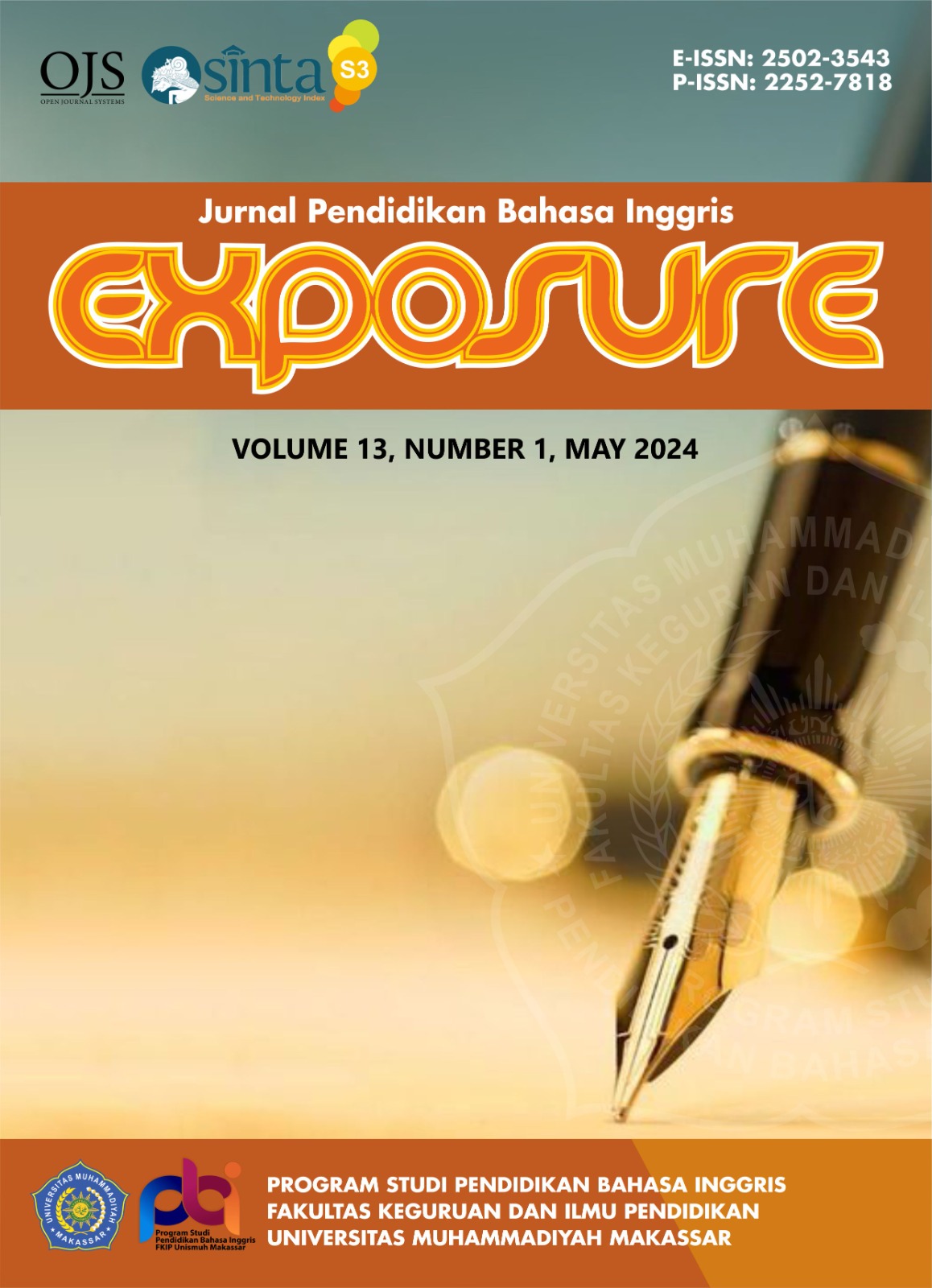THE USE OF MONDLY APPLICATION TO INCREASE SENIOR HIGH SCHOOL STUDENTS’ VOCABULARY MASTERY
DOI:
https://doi.org/10.26618/exposure.v13i1.14216Keywords:
Vocabulary mastery, Mondly application, Language learningAbstract
Vocabulary is an important element in language learning that students have to master. English language learning is greatly influenced by technological advances. Several applications have provided more flexible and accessible means that can be used through smartphones as needed for vocabulary mastery . This study aims to find out how senior high school students can increase their vocabulary mastery through the use of Mondly. A quantitative approach with a pre-experimental design is the method used in this study. The 10th grade students of SMK Tritech Informatika Medan participated in the study.. According to the research findings, the students' mean score was 71.69 on the pretest and 83.53 on the posttest. The t-test with a sig (2-tailed) value of 0.000 or < 0.05 was used to test the hypothesis. Therefore, "Ha" is accepted, and "Ho" is rejected. Thus, it can be concluded that vocabulary learned using Mondly application significantly increased the vocabulary mastery of tenth-grade students of SMK Tritech Informatika.
Keywords: Vocabulary mastery, Mondly application, Language learning
References
Alizadeh, I. (2016). Vocabulary Teaching Techniques: A Review of Common Practices. In International Journal of Research in English Education (Vol. 1, Issue 1). www.ijreeonline.com
Alqahtani, M. (2015). The importance of vocabulary in language learning and how to be taught. International Journal of Teaching and Education, III(3), 21–34. https://doi.org/10.20472/te.2015.3.3.002
Creswell, J. W., & David Creswell, J. (n.d.). Research Design: Qualitative, Quantitative, and Mixed Methods Approaches.
Fryer, L. K. (2020). Emerging Technologies Bots for language learning now: Current and future directions. 24(2), 8–22. http://hdl.handle.net/10125/44719
Hajizadeh, S., Rawdhan Salman, A., & Ebadi, S. (2023). Evaluating Language Learning Applications from EFL Learners’ Perspectives: The Case of Mondly. https://doi.org/10.21203/rs.3.rs-3011332/v1
Husain, N. (2015). Language and Language Skills. https://www.researchgate.net/publication/274310952
Ismatullayeva.(2020). Some Ways of Teaching Vocabulary Through Interaction at the English Lesson. https://doi.org/10.15863/TAS
J., Rezaei, A., Mai, N., & Pesaranghader, A. (2014). The Effect of Mobile Applications on English Vocabulary Acquisition. www.jurnalteknologi.utm.my
Kingsley, N. U., & Kingsley, U. (2019). The Concept and Application of ICT to Teaching/Learning Process. https://www.researchgate.net/publication/332843634
Klimova, B., & Polakova, P. (2020). Students’ perceptions of an EFL vocabulary learning mobile application. Education Sciences, 10(2). https://doi.org/10.3390/educsci10020037
Leis, A., Tohei, A., & Cooke, S. D. (2015). Smartphone Assisted Language Learning and Autonomy. International Journal of Computer-Assisted Language Learning and Teaching, 5(3), 75–88. https://doi.org/10.4018/ijcallt.2015070105
Lessard-Clouston, M. (2013). Teaching vocabulary. Tesol International Association.
Nushi, M., Fattahi, N., & Ebn-Abbasi, F. (2024). An Evaluative Review of Mondly: A Mobile Language Learning Application. The EuroCALL Review, 30(2), 69–85. https://doi.org/10.4995/eurocall.2023.15763
Patahuddin, P., Syawal, S., & Bin-Tahir, S. Z. (2017). Investigating Indonesian EFL Learners’ Learning and Acquiring English Vocabulary. International Journal of English Linguistics, 7(4), 128. https://doi.org/10.5539/ijel.v7n4p128
Rahim, A. (2020). The Use of Mondly Language Application to Improve Students Vocabulary Achievement (Pre-Experiment Research at the Seventh Grade Students of SMP UNISMUH MAKASSAR).
Serena, K., & Ishii Y. (2023). Comparative Study of English Learning Using Virtual Reality and a Smartphone Application. doi:10. 20776/S13482084-71-P99
Wahyu Mahendra, M., Nurkamilah, N., & Permata Sari, C. (2023). Artificial-Intelligence powered App as learning aid in improving learning autonomy: Students’ perspective. https://doi.org/10.21070/jees.v8i1.1699
Downloads
Published
Issue
Section
License
Authors who publish with this journal agree to the following terms:
In order to assure the highest standards for published articles, a peer review policy is applied. In pursue of the compliance with academic standards, all parties involved in the publishing process (the authors, the editors and the editorial board and the reviewers) agree to meet the responsibilities stated below in accordance to the Journal publication ethics and malpractice statement.
Duties of Authors:
- The author(s) warrant that the submitted article is an original work, which has not been previously published, and that they have obtained an agreement from any co-author(s) prior to the manuscript’s submission;
- The author(s) should not submit articles describing essentially the same research to more than one journal;
- The authors(s) make certain that the manuscript meets the terms of the Manuscript Submission Guideline regarding appropriate academic citation and that no copyright infringement occurs;
- The authors(s) should inform the editors about any conflict of interests and report any errors they subsequently, discover in their manuscript.
Duties of Editors and the Editorial Board:
- The editors, together with the editorial board, are responsible for deciding upon the publication or rejection of the submitted manuscripts based only on their originality, significance, and relevance to the domains of the journal;
- The editors evaluate the manuscripts compliance with academic criteria, the domains of the journal and the guidelines;
- The editors must at all times respect the confidentiality of any information pertaining to the submitted manuscripts;
- The editors assign the review of each manuscript to two reviewers chosen according to their domains of expertise. The editors must take into account any conflict of interest reported by the authors and the reviewers.
- The editors must ensure that the comments and recommendations of the reviewers are sent to the author(s) in due time and that the manuscripts are returned to the editors, who take the final decision to publish them or not.
Authors are permitted and encouraged to post online a pre-publication manuscript (but not the Publisher’s final formatted PDF version of the Work) in institutional repositories or on their Websites prior to and during the submission process, as it can lead to productive exchanges, as well as earlier and greater citation of published work (see The Effect of Open Access). Any such posting made before acceptance and publication of the Work shall be updated upon publication to include a reference to the Publisher-assigned DOI (Digital Object Identifier) and a link to the online abstract for the final published Work in the Journal.

